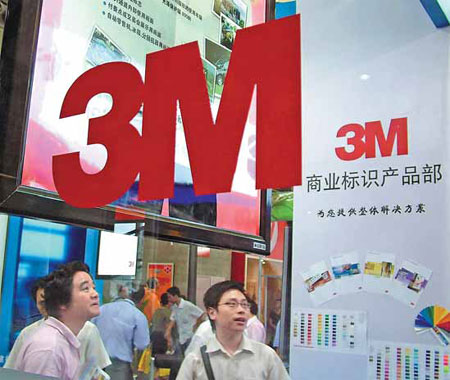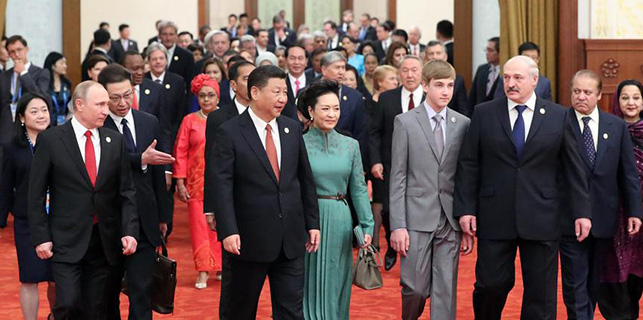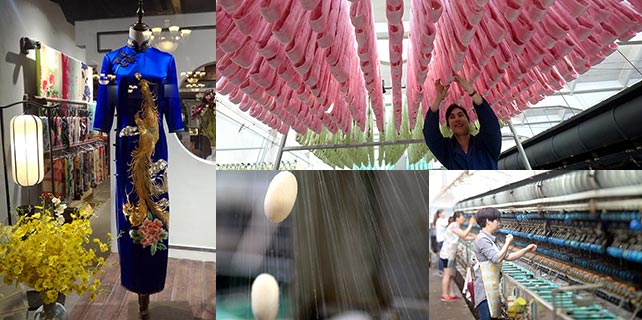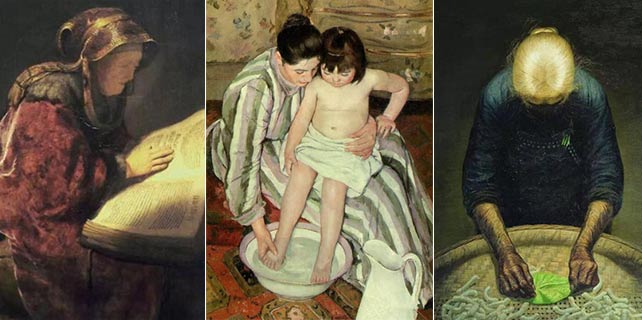Marathon task is pleasure for VP
|
A 3M booth at an international exhibition in Shanghai. China accounted for 10 percent of the US-based company's turnover last year. Provided to China Daily |
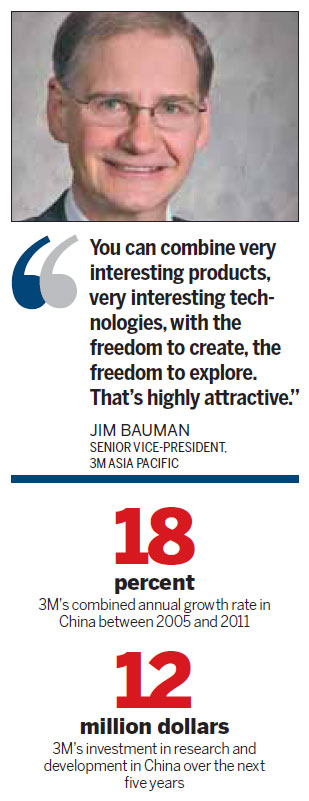
3M Asia-Pacific boss still likes rolling up his sleeves and getting technical at the office
Despite working for the same company for 30 years, Jim Bauman said he still feels fresh every day because there is always something new and always something different to work on.
Bauman is currently senior vice-president of 3M Asia-Pacific, but has been in several positions, including research and development leader, plant manager and business director, in different aspects of the special chemical giant, including automotives, optical films and connectors.
In an innovation-focused company, the 54-year-old said: "You can combine very interesting products, very interesting technologies, with the freedom to create, the freedom to explore. That's highly attractive."
Bauman joined the Minnesota-based company as a memories technologies engineer in 1982 and spent most of his career involved in technological development, new product invention and solution upgrading, in both a technical and managerial capacity.
Taking up his current position last November, Bauman immediately announced an acceleration of its Asian Innovation strategy.
"We want a greater focus on products that are locally developed or can be modified specifically for our markets," he said. "To this end, we are sitting down and talking with our customers and asking them directly what they need to be successful."
The discussions most often take place at 3M's customer technical centers. In the Chinese mainland, uniquely, there are four such centers: in Beijing, Guangzhou, Chongqing and Suzhou. 3M also has a research and development center in Shanghai, one of the company's four global facilities, focusing on basic research.
"A lot of 3M materials are not always something that are so obvious. So for customers to see how these product might work for them, there is no better way for them to experience them, see them, hands-on," said Bauman, adding that the aim is to expose customers to 3M technologies and allow them to cooperate with 3M to develop and build new products and solutions using the 3M brand and tailor-made for customers' needs.
Chinese market
Applying such effort, the company expects annual turnover in China to increase between 15 to 20 percent over the next five years and reach $4.5 billion to $5.5 billion by 2015.
Francis Hu, senior vice-president of staff services for 3M in the mainland and Hong Kong, said that in five to 10 years he expects the company's annual sales in China to exceed those in the United States, the company's home country. Last year, 3M's global turnover reached $29.9 billion, 10 percent of which came from China.
The combined annual growth rate in China was consistently 18 percent between 2005 and 2011. The figure dropped to about 10 percent last year, compared with 2.6 percent globally, because of the international economic slowdown.
"China is right now neck-and-neck with Japan in a race to be 3M's largest subsidiary outside the US," said Bauman.
To support the innovation-centered strategy in China, the fastest-growing market for 3M, the company said at the end of last year that it will invest around $120 million in R&D in China over the next five years. Meanwhile, the number of engineers - currently exceeding 800 - is to double.
So far, its five business groups - industrial products, electronics and energy, safety and graphics, consumer products, and healthcare - all have a presence in China.
Sales in the global special chemical industry jumped to $3.7 trillion last year from $1.8 trillion in 2001, mainly driven by booming demand in Asia, according to a report by international research firm Frost & Sullivan.
Krithika Tyagarajan, senior director with Frost & Sullivan Asia-Pacific Chemicals, Materials and Food Practice, said the new driver of the special chemical industry is innovative and tailored products and solutions instead of bulk chemicals with low profit margins.
A series of major multinationals, such as Dow Chemical Co and BASF SE, are enhancing their R&D efforts in China, seeking profits here to offset flat growth in developed markets, including the US and Europe. They are eyeing the huge market potential in Asia and surging demand for locally developed technologies.
In addition to building and expanding its Asia-Pacific innovation center in Shanghai, Dow Chemical set up a specialty chemical R&D and manufacturing base in Tianjin, which is expected to cost a total of $1.2 billion when the project is completed. It also reached a new agreement with South China University of Technology on microorganism control in April.
The way Dow Chemical's customer innovation center works is similar to 3M's technical service center, creating a platform for its own engineers to work with clients.
BASF said earlier this year it will strengthen customer-oriented R&D globally, especially in the Asia-Pacific region, including China. The Germany-based company expects its sales in the region to reach 2.9 million euros ($3.75 million), making up a quarter of its global business by 2020. BASF's innovation in China will not only be aimed at the nation but also at the entire Asia-Pacific region and globally.
In addition to the multinational archrivals, Chinese companies are developing thanks to supportive government funding and preferential policies.
Chinese companies "get a chance to see technologies emerging quickly and then can innovate from there, so we face challenges", said Bauman, adding that 3M has a good and strong presence and brand so it's really hard for multinational and local competitors to keep up.
On the other hand Bauman believes its good retention of talent is an advantage in helping 3M stand out.
The greatest challenge for multinational companies in China, especially technology-core businesses, is how to retain and attract talent, a fact admitted by the executives of many international companies. A report conducted by Chinese human resources service website Zhaopin.com shows that turnover in technology companies was 15 percent last year and 17 percent in 2010 and 2011. 3M China has a rate below 6 percent.
Highly attractive
"So often we find the best way for us to recruit is by people that work for us talking to their friends, talking to maybe their colleagues in universities about their experiences with 3M. We are very strong in terms of recruitment from just person-to-person within the company," said Bauman, adding that the character of the company - strong on innovation and always creating new things - is highly attractive to engineers and can retain people who possess a genuine scientific spirit.
There are many people like Bauman who have been with 3M for several decades or their entire careers, such as Kenneth Yu, the company's former chief in China.
Bauman said he is a hands-on manager, a good problem-solver and tries to be as open as he can, which can involve returning to his technical background and learning from different people with whom he worked in the company.
From the perspective of technical staff, Bauman maintains a curiosity and inquisitive nature and he likes to go into the details. Evolving from an engineer to a manager, he gradually realized the importance of, and learned, influencing skills. "It seems the higher you go in your career, maybe the more authority you have. But the real power is the ability to influence and communicate in an effective way, to get everybody to share your ideas or to talk collaboratively to understand their ideas," he said.
The tall and fit man loves running and has taken part in several marathons. Working for 3M seems to be another type of marathon for him.
"I love running. I enjoy marathons," he said. "I'll be here as long as I can stay before they kick me out of the door."
liujie@chinadaily.com.cn
(China Daily USA 05/30/2013 page15)




